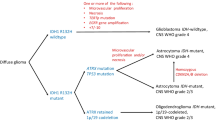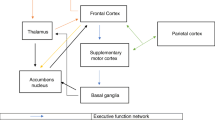Abstract
Background
Patients affected by a high-grade glioma (HGG) have a poor prognosis with a median survival of 12–16 months. Such poor prognosis affects the perception of the remaining life by patients and the neuropsychological status can strongly affect every-day functioning of these patients. Monitoring changes of neuropsychological functioning (NPF) overtime may provide better clinical information and optimize the neuro-oncological management. The aims of our work were (1) to investigate the feasibility of a complex neuropsychological battery in HGG patients before and during follow-up after surgery; (2) to study the neuropsychological profile of patients affected by HGGs and their relation with the disease status (relapse/death) across time after surgery.
Methods
One hundred two patients who received surgery for HGG between 2011 and 2017 were studied. All clinical data were prospectively recorded. NPF was assessed during the neuro-oncological follow-up through the Milano-Bicocca Battery (MIBIB). Statistical analysis was performed on the neuropsychological results of the tests administered.
Results
First, MIBIB proved to be suitable for patients with HGG tumors before and after surgery, and during long-term follow-up; it also showed a cluster structure representative of the principal cognitive domains. Second, we found a steep decline in the neuropsychological profile before death and/or tumor relapse for the 52% of the neuropsychological tests administered.
Conclusion
Complex neuropsychological batteries can be administered to HGG patients before and during follow-up after surgery. There is a correlation between neuropsychological deterioration and tumor relapse and/or death, which may reflect a progressive damage to cognitive functions due to tumor infiltration and progression.



Similar content being viewed by others
References
Baayen RH, Davidson DJ, Bates DM (2008) Mixed-effects modeling with crossed random effects for subjects and items. J Mem Lang 59(4):390–412
Bodensohn R, Corradini S, Ganswindt U, Hofmaier J, Schnell O, Belka C, Niyazi M (2016) A prospective study on neurocognitive effects after primary radiotherapy in high-grade glioma patients. Int J Clin Oncol 21(4):642–650
Bosma I, Vos MJ, Heimans JJ et al (2007) The course of neurocognitive functioning in high-grade glioma patients. Neuro-oncology 9(1):53–62
Bunevicius A, Tamasauskas S, Deltuva V, Tamasauskas A, Radziunas A, Bunevicius R (2014) Predictors of health-related quality of life in neurosurgical brain tumor patients: focus on patient-centered perspective. Acta Neurochir 156(2):367–374
Butler JM, Rapp SR, Shaw EG (2006) Managing the cognitive effects of brain tumor radiation therapy. Curr Treat Options in Oncol 7(6):517–523
Butterbrod E, Bruijn J, Braaksma MM, Rutten G-JM, Tijssen CC, Hanse MCJ, Sitskoorn MM, Gehring K (2019) Predicting disease progression in high-grade glioma with neuropsychological parameters: the value of personalized longitudinal assessment. J Neuro-Oncol 144(3):511–518
Di Cristofori A, Zarino B, Bertani G, Locatelli M, Rampini P, Carrabba G, Caroli M (2018) Surgery in elderly patients with intracranial meningioma: neuropsychological functioning during a long term follow-up. J Neuro-Oncol 137(3):611–619
Di Cristofori A, Zarino B, Fanizzi C, Fornara GA, Bertani G, Rampini P, Carrabba G, Caroli M (2017) Analysis of factors influencing the access to concomitant chemo-radiotherapy in elderly patients with high grade gliomas: role of MMSE, age and tumor volume. J Neuro-Oncol 134(2):377–385
Duffau H (2005) Lessons from brain mapping in surgery for low-grade glioma: insights into associations between tumour and brain plasticity. Lancet Neurol 4(8):476–486
Duffau H, Taillandier L, Gatignol P, Capelle L (2006) The insular lobe and brain plasticity: lessons from tumor surgery. Clin Neurol Neurosurg 108(6):543–548
Durand T, Bernier M-O, Léger I, Taillia H, Noël G, Psimaras D, Ricard D (2015) Cognitive outcome after radiotherapy in brain tumor. Curr Opin Oncol 27(6):510–515
Eckel-Passow JE, Lachance DH, Molinaro AM et al (2015) Glioma groups based on 1p/19q, IDH, and TERT promoter mutations in tumors. N Engl J Med 372(26):2499–2508
Fodor JA (1985) Précis of the modularity of mind. Behav Brain Sci 8(01):1
Habets EJJ, Kloet A, Walchenbach R, Vecht CJ, Klein M, Taphoorn MJB (2014) Tumour and surgery effects on cognitive functioning in high-grade glioma patients. Acta Neurochir 156(8):1451–1459
Hahn CA, Dunn RH, Logue PE, King JH, Edwards CL, Halperin EC (2003) Prospective study of neuropsychologic testing and quality-of-life assessment of adults with primary malignant brain tumors. Int J Radiat Oncol Biol Phys 55(4):992–999
Heimans JJ, Reijneveld JC (2012) Factors affecting the cerebral network in brain tumor patients. J Neuro-Oncol 108(2):231–237
Hervey-Jumper SL, Berger MS (2016) Maximizing safe resection of low- and high-grade glioma. J Neuro-Oncol 130(2):269–282
Hilverda K, Bosma I, Heimans JJ, Postma TJ, Peter Vandertop W, Slotman BJ, Buter J, Reijneveld JC, Klein M (2010) Cognitive functioning in glioblastoma patients during radiotherapy and temozolomide treatment: initial findings. J Neuro-Oncol 97(1):89–94
Julkunen P, Karhu J (2017) Brain plasticity in neurosurgery. In: Krieg SM (ed) Navigated transcranial magnetic stimulation in neurosurgery. Springer International Publishing, Cham, pp 267–285
Kaleita TA, Wellisch DK, Cloughesy TF, Ford JM, Freeman D, Belin TR, Goldman J (2004) Prediction of neurocognitive outcome in adult brain tumor patients. J Neuro-Oncol 67(1–2):245–253
Klein M (2015) Treatment options and neurocognitive outcome in patients with diffuse low-grade glioma. J Neurosurg Sci 59(4):383–392
Klein M, Postma TJ, Taphoorn MJB, Aaronson NK, Vandertop WP, Muller M, van der Ploeg HM, Heimans JJ (2003) The prognostic value of cognitive functioning in the survival of patients with high-grade glioma. Neurology 61(12):1796–1798
Klein M, Taphoorn MJ, Heimans JJ et al (2001) Neurobehavioral status and health-related quality of life in newly diagnosed high-grade glioma patients. J Clin Oncol 19(20):4037–4047
Louis DN, Perry A, Reifenberger G, von Deimling A, Figarella-Branger D, Cavenee WK, Ohgaki H, Wiestler OD, Kleihues P, Ellison DW (2016) The 2016 World Health Organization classification of tumors of the central nervous system: a summary. Acta Neuropathol 131(6):803–820
Noll KR, Weinberg JS, Ziu M, Benveniste RJ, Suki D, Wefel JS (2015) Neurocognitive changes associated with surgical resection of left and right temporal lobe glioma. Neurosurgery 77(5):777–785
Noll KR, Ziu M, Weinberg JS, Wefel JS (2016) Neurocognitive functioning in patients with glioma of the left and right temporal lobes. J Neuro-Oncol 128(2):323–331
Oort Q, Dirven L, Meijer W, Sikkes SAM, Uitdehaag BMJ, Reijneveld JC, Taphoorn MJB (2017) Development of a questionnaire measuring instrumental activities of daily living (IADL) in patients with brain tumors: a pilot study. J Neuro-Oncol 132(1):145–153
Papagno C, Casarotti A, Comi A, Gallucci M, Riva M, Bello L (2012) Measuring clinical outcomes in neuro-oncology. A battery to evaluate low-grade gliomas (LGG). J Neuro-Oncol 108(2):269–275
Pringle AM, Taylor R, Whittle IR (1999) Anxiety and depression in patients with an intracranial neoplasm before and after tumour surgery. Br J Neurosurg 13(1):46–51
Sanai N, Polley M-Y, McDermott MW, Parsa AT, Berger MS (2011) An extent of resection threshold for newly diagnosed glioblastomas. J Neurosurg 115(1):3–8
Satoer D, Visch-Brink E, Dirven C, Vincent A (2016) Glioma surgery in eloquent areas: can we preserve cognition? Acta Neurochir 158(1):35–50
Satoer D, Vork J, Visch-Brink E, Smits M, Dirven C, Vincent A (2012) Cognitive functioning early after surgery of gliomas in eloquent areas: clinical article. J Neurosurg 117(5):831–838
Scheibel RS, Meyers CA, Levin VA (1996) Cognitive dysfunction following surgery for intracerebral glioma: influence of histopathology, lesion location, and treatment. J Neuro-Oncol 30(1):61–69
Stupp R, Hegi ME, Mason WP et al (2009) Effects of radiotherapy with concomitant and adjuvant temozolomide versus radiotherapy alone on survival in glioblastoma in a randomised phase III study: 5-year analysis of the EORTC-NCIC trial. Lancet Oncol 10(5):459–466
Stupp R, Mason WP, van den Bent MJ et al (2005) Radiotherapy plus concomitant and adjuvant temozolomide for glioblastoma. N Engl J Med 352(10):987–996
Talacchi A, Santini B, Savazzi S, Gerosa M (2011) Cognitive effects of tumour and surgical treatment in glioma patients. J Neuro-Oncol 103(3):541–549
Taphoorn MJB, Klein M (2004) Cognitive deficits in adult patients with brain tumours. Lancet Neurol 3(3):159–168
Teixidor P, Gatignol P, Leroy M, Masuet-Aumatell C, Capelle L, Duffau H (2007) Assessment of verbal working memory before and after surgery for low-grade glioma. J Neuro-Oncol 81(3):305–313
Tucha O, Smely C, Preier M, Lange KW (2000) Cognitive deficits before treatment among patients with brain tumors. Neurosurgery 47(2):324–333 discussion 333-334
Wen PY, Macdonald DR, Reardon DA et al (2010) Updated response assessment criteria for high-grade gliomas: response assessment in neuro-oncology working group. J Clin Oncol 28(11):1963–1972
Author information
Authors and Affiliations
Contributions
B.Z., A.D.C., and G.A.F.: concept of the study, writing of the manuscript, and data collection.
G.A.B., M.L., P.R., F.C., and G.C.: revision of the manuscript, analysis of clinical data.
M.C.: neuro-oncological follow-up of the patients, data collection, and manuscript revision.
D.C.: writing of the manuscript, analysis of neuropsychological data
Corresponding authors
Ethics declarations
Conflict of interest
The authors declare that they have no conflict of interest.
Ethical approval
All procedures performed in studies involving human participants were in accordance with the ethical standards of the institutional and/or national research committee and with the 1964 Helsinki declaration and its later amendments or comparable ethical standards.
Informed consent
Informed consent was obtained from all individual participants included in the study.
Additional information
Comments
In this study, the authors address the question of long-term follow-up of neuropsychological functions in patients with high grade gliomas (HGG). In particular, it is assessed how can cognitive status predict patient’s outcome after surgery. The conclusion is that there is a correlation between neuropsychological deterioration and HGG relapse and/or death, which may reflect a progressive damage to cognitive functions due to tumor infiltration and progression. This present study nice completes some other reports in the current literature. It has been previously acknowledged that cognitive impairment occurs in the majority of treatment-naive glioma patients, suggesting that neurocognitive dysfunction is related to the tumor (doi.org/10.1007/s11060-017-2503-z). Moreover, and more important, patient-tailored cognitive assessment may be a non-invasive addition to disease monitoring without overburdening patients and clinical care (doi.org/10.1007/s11060-019-03249-1). One could imagine that machine learning based prediction models would be developed in the near future. Yet, much heterogeneity is present among reports and should be of our concern to strive for standardised battery test in the frame of multicentric trials.
Constantin Tuleasca
Lausanne, Lille, France
Publisher’s note
Springer Nature remains neutral with regard to jurisdictional claims in published maps and institutional affiliations.
This article is part of the Topical Collection on Tumor - Glioma.
Electronic supplementary material
ESM 1
(XOCX 167 kb)
Rights and permissions
About this article
Cite this article
Zarino, B., Di Cristofori, A., Fornara, G.A. et al. Long-term follow-up of neuropsychological functions in patients with high grade gliomas: can cognitive status predict patient’s outcome after surgery?. Acta Neurochir 162, 803–812 (2020). https://doi.org/10.1007/s00701-020-04230-y
Received:
Accepted:
Published:
Issue Date:
DOI: https://doi.org/10.1007/s00701-020-04230-y




